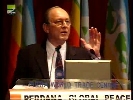Humanitarian Crisis in Syria: “The West should Pay War Reparations to Syria”. Interview with Michel Chossudovsky

Press TV has conducted an interview with Michel Chossudovsky, Center for Research on Globalization, Montreal, on the back of UN concern for the Syrian war spilling over into other countries.
The following is an approximate transcript of the interview.
If unable to view download at:
http://64.150.186.181/presstv/site%20video/06-08-2013/chussodovsky.mp4
Press TV: The UN is warning of an explosion in the Middle East if the war on Syria continues. The question is what has the UN itself done to prevent the war from exacerbating?
Chossudovsky: First of all, that statement was made by the head of the United Nations High Commission for Refugees. And the statement says that if the fighting doesn’t stop… the fighting is going to stop because the terrorists have been defeated.
And essentially if Western powers put a moratorium on their support to these al-Qaeda affiliated rebels, the war is over – at least, the ground war is over. Recent developments suggest and confirm that the country is under the control of the Syrian government. The rebel forces have been defeated in al-Qusayr and they’ve also been defeated in other parts of the country.
The question of humanitarian aid has to be, from my standpoint, addressed because, who are the protagonists of humanitarian aid, so-called humanitarian aid? Precisely the countries, which supported these rebel terrorists.
And I think what we should be raising at this stage is that it is well established that this war was waged by the United States, NATO and Israel with the support of the [Persian] Gulf states, Qatar and Saudi Arabia in particular and that under international law what is now required is war reparations.
So I would say: let us put the “humanitarian dimension” aside and focus on the billions and billions of dollars of war reparations, which are due to the Syrian government as a result of the illegal support of these terrorist formations in Syria, which constitute essentially the ground forces – the foot soldiers of the Western military alliance.
Press TV: The recent victory in Qusayr and the recent revelation that Israeli-made weapons were seized from Syrian insurgents – What impact will this have on the dynamics of the conflict?
Chossudovsky: We’ve known from day one that Israel has supported al-Qaeda. And we also know that Israel has channeled weapons and logistic support to the rebels in the areas surrounding the occupied areas of the Golan Heights. And in fact Israel even established a hospital facility for the al-Qaeda rebels and was busing them back and forth, taking the wounded to the hospital and then sending them back to the war theatre.
Israel was involved in acts of aggression against a sovereign state together with NATO, particularly Turkey, Britain, France, the United States. French and British Special Forces, including SAS forces, MI6 and CIA agents were involved – We know it because it’s documented. Who is training the rebels in chemical weapons? The Western military alliance.
Prime Minister Laurent Fabius of France comes out –and it’s the typical sort of weapons of mass destruction saga– accusing the government of using chemical weapons against civilians when in fact CNN confirms that Western forces are training the rebels in the use of chemical weapons; when the Turkish police arrests al-Qaeda rebels – it just happened a week or so ago [the rebels had chemical weapons in their possession]
So we know that all this is fabrication, whereby the Western military alliance is accusing the government of committing atrocities, which they themselves have committed.
What we must now tackle at an intentional level is war reparations. The war is over unless of course the West decides to continue this war e.g. with a no-fly zone. That would be an extremely dangerous option at this stage because Syria has an advanced air defense system.
The S-300 is in place; it has been building up over the past 18 months; there are other elements of air defense; and it would be very unwise for the Western military alliance to impose a no-fly zone, which would immediately be subject to some kind of response.
So that is the background. This war has reached a point of transition. If there is no intervention on the part of the Western military alliance, the war is over.

